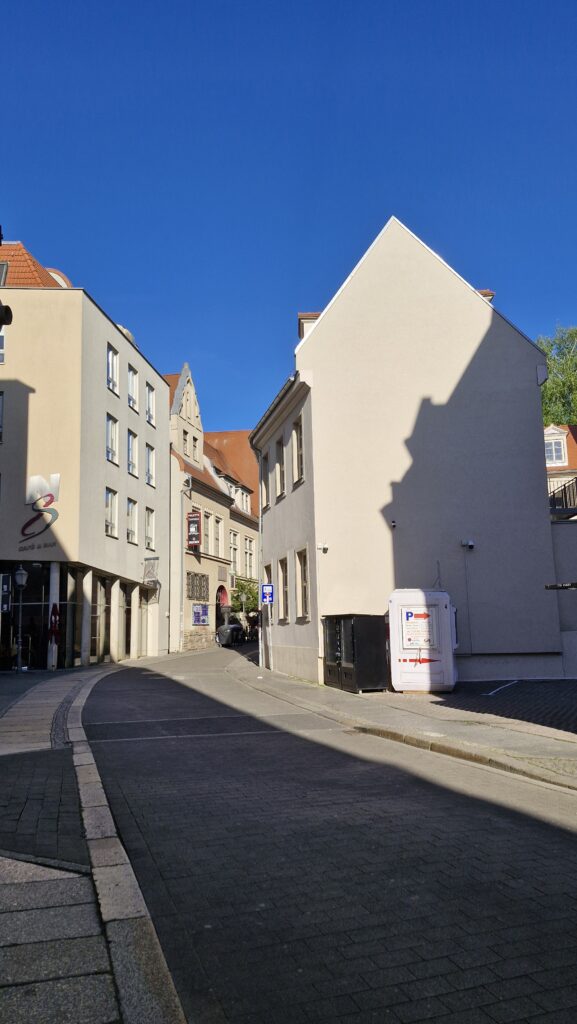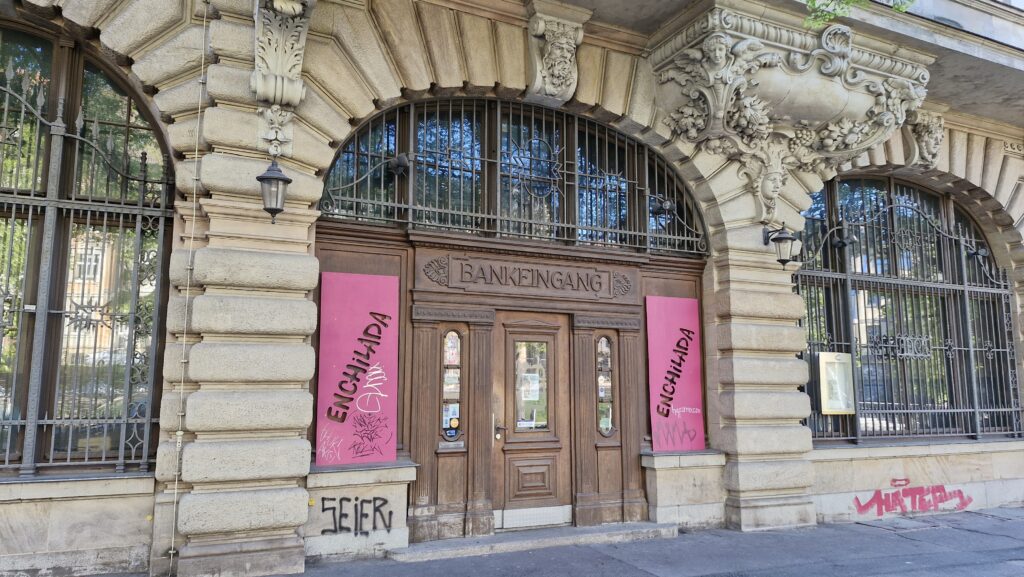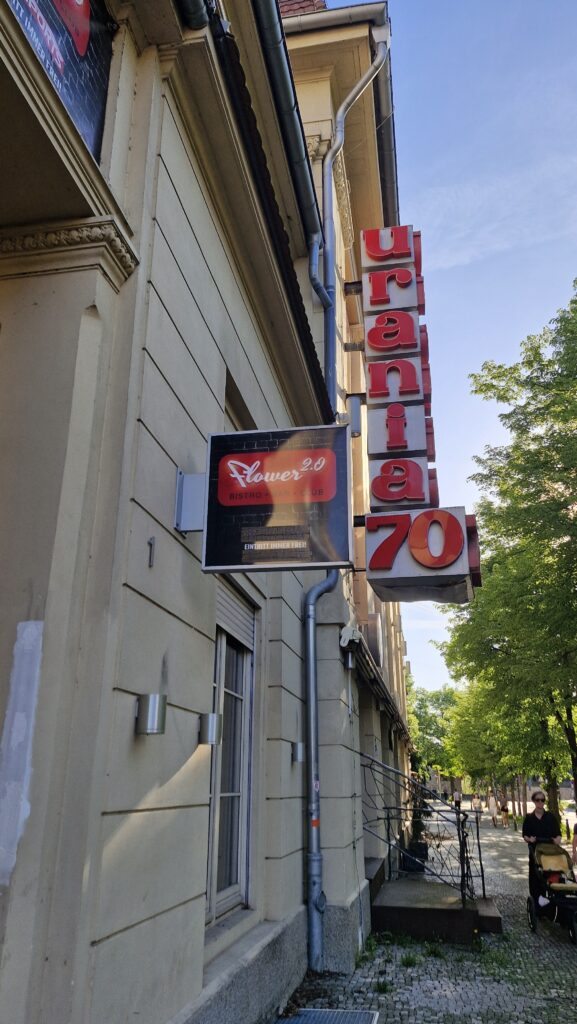Be it Schorre, Enchi or Flower 2.0, what used to be vibrant meeting spaces for young people is now filled with a yawning void. It remains to be answered where this phenomenon of “dying clubs” has come from and how it should be dealt with – looking into the past and future of Halle’s clubbing landscape.
In his treatise “The Great Good Place”, American sociologist Ray Oldenburg has described the importance of so-called “third places” for functioning social interactions. In addition to home as the “first place” and work or class as the “second place”, “third places” constitute detached, informal, and neutral meeting spaces for people, free from pressure to consume and social implications. Admittedly, this theory can’t be simply applied to clubs and bars, as entry fees and drink prices clearly require a budget; nonetheless they are undoubtedly important for the development and individualisation of young people. This view is shared by Reinhold Sackmann, professor of sociology, who responds to a press inquiry explaining that clubs play “an important role in mixing social circles” as they “facilitate acquaintances across milieus”. He considers them crucial for shaping the social self, in particular because “playing with attraction and rejection, individual staging and collectively experiencing transgression [is] something that makes youth youth and turns young adults into personalities.”
In a data survey by IfD Allensbach in 2024, no less than 30 percent of the German population aged 14 and over reported visiting discothèques at least every now and then. And yet the Federal Statistical Office has been indicating a degressive number of night clubs at least until 2022. In fact, the quantity of relevant establishments has even approximately halved since 2007. On top of that, the occasional use of excuses “out of laziness” to evade coming along to the club is at an all-time high among Gen Z, while alcohol consumption has been declining for years. These developments are not limited to Halle, but can be observed from Hamburg to Berlin to Leipzig in a multitude of cities and even villages. So, can our generation just not be bothered having boozy nights with friends anymore?

Nikolaistraße, a club that still exists.
“In the ‘golden age’ of the 1960s to the 1990s, clubs and discos used to be […] opportunities to establish contacts […]. With Tinder and other platforms, alternatives for approaching people have emerged”, writes Sackmann in response to this question. “With Tinder, I’m exposing myself e. g. to fewer insecurities, but have an (ostensibly) larger choice than in the club.” In other words, discothèques have lost their charm as places to meet and socialise now that satisfying both one’s platonic and sexual needs through Internet services has turned out to be more universally accessible and less formal. Sackmann’s proposition is supported by another Allensbach survey, according to which around 40 percent of Germans between the ages of 14 and 29 use Internet services such as Tinder or Bumble to make new short- or long-term acquaintances. This means that the younger generations in particular, who are meant to be the main audience of clubs, and whose demographic is already less and less present in society, are no longer socially dependent on these meeting places.
But it’s not just some changed habits of young people that are responsible for the fading club culture. As another influence, professor Sackmann cites the Covid-19 pandemic, which has forced many such institutions to close for financial reasons. “Since the long-term trend speaks against clubs, the risk of starting a business in this rather capital-intensive segment of the catering trade is higher than in other enterprises,” he writes, adding another explanation for the lack of new openings.
The gap is filled with establishments such as bars because “the capital and personnel expenditure needed to set up and operate bars is substantially lower”. Still, Sackmann points out that due to their size and their lack of social inclusivity, bars can by no means replace discos.
A chronicle of Halle’s meeting places
Moving away from theory to the reality on the ground, our time travel through Halle’s club demise begins in 2017 at the Leipziger Turm. On New Year’s Eve, La Bim opened its gates for the last time, with the slogan “All must go”, to see in the new year 2018. They had to close because the community of heirs who were granted the property in 2009, which was once a printing company and had been seized in the era of the German Democratic Republic, had sold it to a large investor from Leipzig.
What followed was a long period of anxiety about the future of this “cultural venue”, as it was called in a petition to save the institution addressed at then-mayor Wiegand and his administration. It had garnered around 3,500 signatures and over 600 excited comments — and yet it never received a reply. In April 2018, the eviction was finalised.
La Bim was much more than just a nightclub. In the early 1990s the project started out as an independent cinema at the same venue, yet quickly evolved into a cultural centre. Till the end, flea markets, film screenings, poetry slams and, not least, parties took place.
The next dance hall on our list was struck about two years later: In December 2019, the underground club Chaiselongue “Chaise” was evicted from premises of the Reil78 cultural centre after a series of conflicts between both parties. Towards the end, Chaise supporters had occupied the space for several days to prevent the closure.
In 2022, Schorre had met its final days, too. At the end of May the discothèque hosted its last party before closing. The owner had let the lease expire in order to demolish the building and erect senior flats in its place. Two years later, the dismantling of the cultural venue with about 150 years of history actually began, despite numerous objections from the city council and the public as well as a petition with approximately 6,500 signatures to preserve Schorre. It should be noted that the operators intend to find a new place for Schorre. This year on Easter Eve, the organisers held a party for the first time since 2022 — albeit at Volkspark and not at a venue of their own.

1890, the venue was known as an inn named “Zum Hofjäger”. In the German
Democratic Republic, however, a youth club had been housed there.
Last year had seen no less than two closures, which grieved Halle’s students in particular. In February, Flower 2.0 hosted its last party for the time being. The owner of this Karaoke stronghold had died in an accident a few years earlier. Upperclub, a smaller venue of Palette, has since hosted Flower 3.0 parties with free admission.
In the same vein, Enchilada “Enchi” deserves a mention, although it was more of a bar than a club. Especially on Mondays, many young people were drawn to the former bank building for the so-called Cocktail Casino, where they could roll dice to determine the prices of drinks. The sudden end of this food and drink chain’s Halle franchise was explained with personnel and financial difficulties.
Beyond the four club walls
What fits the profile of third places even better, considering there is no pressure to consume, are “meeting points in public space such as Bebel-Platz or the square in front of Landesmuseum”, to which Sackmann attributes a similar functionality as clubs. Here, too, strong social mixing takes place, just without fog machines and high entry fees. But they come with their own problems. “Conflicts with residents arise frequently because, unlike clubs, these places lack sound insulation.” says Professor Sackmann. This can be observed particularly at August-Bebel-Platz, where quarrels between young adults and residents are not a rare occurrence. At some point, the city had even hired a private security firm to impose order there.

franchise of the Mexican-style food and drink chain
Enchilada was housed in an old bank building.
One alternative to any open-air spaces, which are no longer a real option by winter anyway, is the project Reil78. In 2001, activists occupied a vacant children’s home and converted it into a cultural centre. Today the house is “a subversive space for music, art, sports, education, political discourse, social encounters, and self-organised non-commercial events”, as the project operators state on their website. Individuals can request rooms for their own events, but permanently organised food kitchens for all “Küfa” and self-defence trainings are also regularly offered there.
However, the cultural centre had faced one difficulty for a long time: the house and property were still considered occupied. This would change after years of negotiations through an official purchase agreement with the city. In June 2024, the city council passed a relevant resolution on an amount of 30,000 euros. However, this lasted only for a short time as the balance of power had shifted after the city council election in the same month. The Christian-Democratic Union (CDU) requested to withdraw the decision right at the first meeting in the new term and received support for this move from the right-wing Alternative for Germany (AfD) and the Free Democrats (FDP). This proposal in turn sparked extensive debates. Former Christian Democrat Alexander Vogt, who now serves as a non-partisan mayor, criticised his own council group. Moreover, a petition with nearly 18,000 signatures showed a wide civic interest to preserve the cultural institution. “Once again this shows clearly that Reil78 is an important place to go for people in the city”, the operators write on their website.

In the end, the CDU’s motion VIII/2024/00185 failed to gain a majority due to one abstention from its own ranks. Instead, there was a tie of 26 votes for and 26 votes against the property sale, by which “the motion or submission is [deemed] rejected”, as stated in the city council’s rules of procedure. Thus, in October of last year, the city actually had to transfer the property at the previously agreed price.
Could this mark a halt to the loss of cultural sites in Halle? Well, that remains to be seen. Professor Sackmann, at least, considers it “worthwhile to think about low-conflict meeting sites in public space. Past ideas on [for example] making a somewhat more pleasant use of the Ziegelwiese should be pursued again.”
This suggestion might resonate with mayor Vogt. Answering an inquiry from the student council, he wrote that he wants to “foster club culture, support self-managed free spaces, design safe meeting places, and create leisure opportunities”. He aims to develop the city so that “more students enjoy living here again, too”. However, he did not specify any steps for this and didn’t want to respond to a press inquiry by hastuzeit without consulting his press officer, who would only start her job after the editorial deadline for this issue.
But beyond politics, “each and everyone can take action rather easily” to participate in preserving social meeting spaces, as Sackmann points out. “Organise parties in your own spaces and broaden your invitations. Or contribute to organising parties within the department group,” these are just some of the possible steps. He adds that is it important to leave certain habits and behaviour patterns from the time of the pandemic behind. According to him, this is “with all the risks considered, a gain for your own well-being.”
Text and Photos: Till Menzel
Translation: Konrad Dieterich
